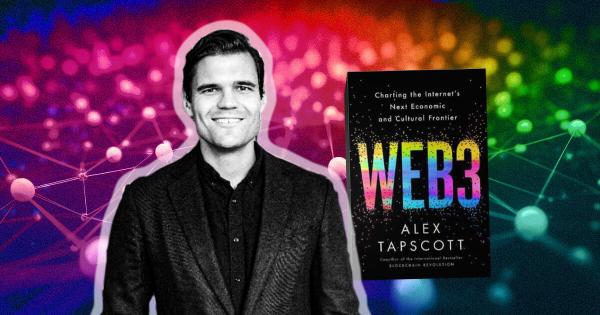No newcomer to the world of blockchain and cryptocurrencies, Alex Tapscott, has a decorated history in the blockchain world. He has co-authored an international bestseller on the subject, founded a blockchain research think tank, and, as Managing Director at Ninepoint Partners, Tapscott has brought digital assets to markets in his native Canada.
His new book, Web3: Charting the Internet’s Next Economic and Cultural Frontier—out today from HarperCollins—follows his 2016 bestseller Blockchain Revolution by providing a lucid account of the major themes in the Web3 sector today for a mass audience.
Tapscott spoke with CryptoSlate to share his vision for how blockchain and cryptocurrencies will shape businesses and society in this next era of the internet.
The Promise and Problems of the Early Internet
When Tapscott first became interested in Bitcoin (BTC) in 2013, he saw it mainly as a new kind of payment network. Like many, however, his thinking evolved as he realized the potential for blockchain technology went far beyond finance. As Tapscott says, “This is a general-purpose technology that will have a very broad impact on every industry in the world.”
In Tapscott’s view, the early promise of the internet has gone largely unfulfilled. While the web has enabled easy access to information and publishing, most value capture has accrued to a handful of large platforms such as Facebook, Google, Amazon, and Apple.
Tapscott’s book argues that new technologies like cryptocurrencies, decentralized finance (DeFi), and non-fungible tokens (NFTs) enable new models of digital ownership. These new models As Tapscott puts it, “I think we’re going to end up in a world where these arteries of commerce online and these financial intermediaries are just less powerful, handle less value, have less economic major sway in the world.”
A Pragmatic Approach to Web3
Tapscott positions himself as a pragmatist when it comes to Web3. The Blockchain Research Institution he founded helps stakeholders incorporate blockchain into their existing businesses.
As Tapscott explains, “This is a toolkit. It’s the Web3 toolkit. It’s a box of toys and tools that you can reach into, and you may find that there’s something in there that’s really useful for your business.”
He points to companies like PayPal, Visa, Nike, and LVMH that are already pulling valuable tools from the Web3 toolkit without needing to go “all-in.”
However, Tapscott does foresee a future where today’s internet giants will be less potent due to the innovations of Web3. Still, he does not see traditional models being thrown out and replaced overnight. As he colorfully puts it, “The golden goose might die of old age, but you don’t need to take it to the chopping block, right?”
Why Web3 Represents the Next Frontier
Tapscott compares Web3 to the frontier, a deliberate and intentional metaphor. He tells CryptoSlate:
Frontiers attract dreamers, visionaries, and they attract the dumb and the naive, and they attract criminals and hustlers, and they also attract shrewd business people who end up usually creating immense wealth on these frontiers. I think that’s probably true here… to simplify that a little bit more, I would say that the the world of Web3 can probably be broken down into missionaries, mercenaries and pragmatists, and I view myself as in the third.
Missionaries and mercenaries occupy the extreme ends of the spectrum, motivated by pure idealism or opportunism. Pragmatists occupy the reasonable middle while still sympathetic to the missionary vision of a better digital world.
Tapscott also discusses the widespread concern today about the impact of technology on democracy, social discourse, creator livelihoods, and economic concentration. While Web3 originated from similar concerns after the 2008 financial crisis, Tapscott says the critique has expanded to include the power of tech platforms, saying:
“If we do this right, there’s an opportunity to rewrite the economic power grid and the old order of human affairs for the better. I think this technology can be a really critical part of that.”
Tapscott sees Web3 as the first technology wave emerging when human capital and tech tools are equally distributed worldwide. He says, “I see the pioneers on this frontier are all around the world.”
Tapscott notes that frontiers carry risks as well as opportunities. He hopes that his new book can serve as a guide to realizing the positive potential of Web3 while avoiding pitfalls. If Tapscott succeeds in that educational mission, it may solidify his reputation as the foremost mainstream writer on blockchain tech and Web3.
Web3: Charting the Internet’s Next Economic and Cultural Frontier is out today from HarperCollins and is available through major booksellers worldwide.
The post Missionaries, mercenaries, and pragmatists: Alex Tapscott’s new book brings the case for Web3 appeared first on CryptoSlate.








